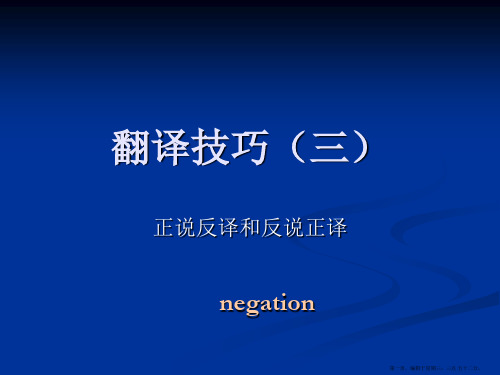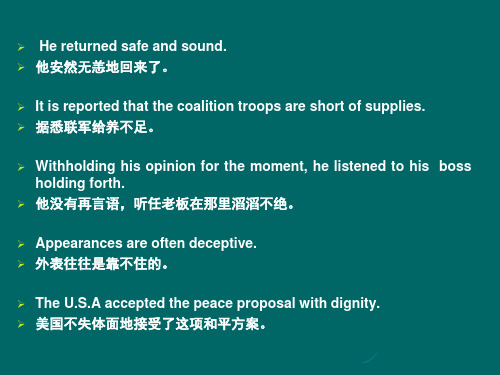肯定与否定的翻译页
英语否定转移翻译ppt课件

主句的谓语动gine,expect,fancy等表示‘认为’, ‘猜想’的动词时,其后宾语从句中的否定词 not应该移至主句中
He didn’t go to school by bus.(=He goes to school not by bus.) 他不是乘公交车去上学.
Rome was not built in a day.(=Rome was built not in a day.) 罗马并非一日建成.
六、暗含否定(Implied Negation)
从前线回来的人说起白求恩,没有一个不佩 服,没有一个不为他的精神所感动.
Before Iiberation he was a cart—driver who could hardIy keep body and soul together,let alone support his family.
三、双重否定(Double Negation)
否定之否定。实际上是肯定。但其语气较强。无 论该否定是形式上的还是意义上的,在翻译时, 应根据句子语气翻译成肯定句或双重否定句.
I wouldn’t be saying this unless I were sure of the facts. 要是我对这些事情没有把握,我就不说这话了。
解放前,他是个赶大车的,连自己的生活 都难以维持,更不用说养家了.
At that time we didn’t have computers,to say nothing of e-mail and Internet.
那时,我们连电脑都没有,更不用说电子 邮件和因特网了。
[英语学习]肯定与否定的翻译
![[英语学习]肯定与否定的翻译](https://img.taocdn.com/s3/m/24ab35f176eeaeaad1f3307c.png)
无疑,他是一位有进取心的青年人。
What he said is beside the question.
他说的与本题无关。
Good advice is without price.
好的建议是无价的。 It is far from him to do anything to hurt
肯定与否定的翻译
一、英语肯定、汉语否定
形式上,英语采用肯定句式,但实际在含蓄表达否定 意义,翻译成汉语时用否定。 (1)动词 英语中含有否定的动词有:fail, miss, lack, ignore, escape, refuse, withhold, neglect, deny, overlook, exclude, differ, forbid, defy, hate, etc.. 动词词组:keep… from…, refrain…from… Eg. To our disappointment, he failed to take the overall situation into account. 使我们失望的是他不顾大局。
He was deaf to all advice.
他不听一切劝告。 I am glad to see you safe and sound. 我很高兴看到你安然无恙。 He would be the last man to say such
things. 他决不会说这种话。
She went to the airport to meet her friend, but she missed her in the crowd.
她去机场接她的朋友,可是没能在人群中见到她。
Байду номын сангаас
研究生翻译第八章肯定与否定

第八章肯定与否定1.They often talk horse. 他们常常吹牛。
2.That woman walks the streets. 那个妇女是妓女。
3.I’ll report that official. 我要检举那位官员。
4.The machine is in repair. 那台机器状况良好。
5.We’ll stand up to the project. 我们将抵制这个计划。
6.Don’t make a fuss of them! 别讨好他们!7.She is in the dock. 她在被告席。
8.The boss gave her the sack. 老板解雇了她。
9.That girl student is in the green. 那位女学正值豆蔻年华。
10.The old lady has gone to her rest. 那个老太太安息了。
11.That young man has lost his heart. 那个青年人处于热恋之中。
12. The old man often takes his medicine. 那老人常忍受不愉快的事。
13. That fellow did hard labor for 3 years. 那个家伙服过三年劳役。
14. The woman in labor is his wife.分娩的妇女是他的妻子15.I’m not a little afraid of snakes我很怕蛇。
16. We charged him to quit his job. 我们责令他辞职。
17.They surprised him stealing. 他们撞上他偷东西。
18. I have seen him through. 我帮助他过难关。
19.He is the Speaker. 他是议长。
20. Where is the Book? 圣经在哪?21.Do you know anything about japan? 你了解日本漆吗?22.I bought some salts yesterday.我昨天买了一些泻药。
句子翻译(三)+ 肯否定转换

All that glitters is not gold.
最近我收到的邮件不太多。
I haven’t received much mail recently.
④ 汉语用“几乎不、很少”表示“半否定”
Far from: Free from: Not …because Not…more Half, nearly, possible 和 not 用在一起时 Not nearly根本不像 could not possibly用来加强语气,不能译为 “不可能”。
(4) 双重否定的使用
Too…to 不是只在见到 “太…以致于不能”才用 only too… to I am only too delighted to accept your kind
invitation.我接到你的盛情邀请太高兴了。 Not/never too… to相当于 not so …that …not…/ 而too… not to…等于so…that…cannot but Cannot…too…等于it is impossible for us to over+ 原形动词。
英语中有一类含有否定意义的词,它们形式上是肯
定的,但意义是否定的,在翻译汉语否定句时,可 直接使用,而不必再加否定助词no,not等。此类英 语词包括: 动词avoid,deny,doubt,escape,exclude,fail, ignore,keep...from,lack,miss,refuse,refrain from,remove from,neglect,overlook,save等; 名词absence,exclusion,exception,failure, ignorance,lack,neglect,refusal等;
ch7正反译法

正说反译和反说正译
negation
第一页,编辑于星期三:三点 五十二分。
We will live up to what our parents expect of us.
我们不能辜负父母的期望。
I do not doubt that he will be appointed sales manager of the company.
Appearances are deceptive. 外貌是靠不住的。
第二十一页,编辑于星期三:三点 五十二分。
It+be+adj.+noun+that…
It is a wise father that he knows his own child. It is a long lane that has no turning. 聪明的父亲也未必了解他自己的孩子。
3.He aims at inhuman perfection in everything he does.
4. Styles come and go, but good taste is timeless. 5.Suddenly he heard a sound behind him, and realized he
第十二页,编辑于星期三:三点 五十二分。
(4)adverbs
little 一点不 hardly 几乎不 seldom 不常
barely 几乎不/无遮蔽的 may safely say so. 我们这样说万无一失(或:错不了)。
2.——The boy is quite clever. 这孩子很聪明。
(2) adjectives:
Ignorant 无知的
翻译技巧7肯定与否定-表达转换译法.

6
返回章重点 退出
英语中这类否定大多是用否定词来表示。否定词 覆盖面很广,包括名词、代词、动词、形容词、副词、 介词、连词等。其否定形式复杂多样,除了使用否定 词外,还大量使用否定词缀,如“dis-, il-, in-, im-, ir-, non-, un-, anti-, -less, under-”等;形式肯定意 义否定的动词如 “avoid, ban, call off, cancel,
表达转换译法
Affirmative & Negative Expressions in Translation
退出
表达转换译法
Affirmative & Negative Expressions in Translation
表达转换译法亦称“正说反译法”、“正反译 法”、“反正、正反表达法”,即以“正”译“反” 或以“反”译“正”来表达原语的内容。由于民族、 文化、思维方式、语言表达等众多方面的差异,一 种语言用正面讲的话,另一种语言无法直白原语的 内容,为求语用、修辞相当、或出于语言习惯要用 相反的方式表达出来,用否定的说法来表达原语肯 定的形式,或以肯定的说法来表达原语否定的形式。
3
返回章重点 退出
又比如,有一位老大爷,骑自行车的技术 还算可以,常在人堆里骑行而不愿下车。有一 次,他却惹了麻烦,车前轮撞上了一位先生, 这位先生人高马大,这下可好看了,非闹一场 不可!可这位先生却冲他噗嗤一笑:“呦!看 你年纪不少,技术还不错咧!” 这话 “社会 效益”好,用肯定的方式表达了否定的意义, 把老大爷给臊了个大红脸,其效果比打还厉害。
11
返回章重点 退出
例1:An opportunity is not likely to repeat itself.
翻译技巧7肯定与否定-表达转换译法.

6
返回章重点 退出
英语中这类否定大多是用否定词来表示。否定词 覆盖面很广,包括名词、代词、动词、形容词、副词、 介词、连词等。其否定形式复杂多样,除了使用否定 词外,还大量使用否定词缀,如“dis-, il-, in-, im-, ir-, non-, un-, anti-, -less, under-”等;形式肯定意 义否定的动词如 “avoid, ban, call off, cancel,
21
返回章重点 退出
补充例句 例1:We never thought of nothing wrong.
(=We never thought of anything wrong.) 【译文】我们从来没想到有什么错误。(重复否定) 例2:Waste not, want not. (=If you don’t
【译文】这些事引起了我们的重视。 例2:He has no small chance of success. 【译文】他大有成功的可能。 例3:Nothing is useless to man. 【译文】样样东西都有用。(双重否定用来表示强烈肯定)
15
返回章重点 退出
补充例句
例4:The thought of returning to his native land never deserted him amid his tribulation.
【译文】在波兰这里,人们真不懂得怎么吃。老 是鸡汤面条、面条鸡汤。面条算什么饭—— 一碗水,只胀大了肚皮。
13
返回章重点 退出
例4:No man can have too much knowledge and practice.
【译文】知识和实践越多越好。 例5:That’s not a man that lives who does
正反译法

1.2.
Verb 1) He hates going to work late. 他不喜欢上班迟到。 (hate 可译作“不愿”,“不喜欢”。)
2)
The doctor lost his patient. 医生没把病人治好。 (lose 可译作“未能……治好”。) 3) The motor refused to start. 马达开不动。 (refuse 表示“不愿”、“不肯”、“无 法”。)
作为名词用的含蓄否定词还有: defiance
(不顾,无视) denial (否认,否定) exclusion (排除) freedom (不,免除) lack (无,缺乏) failure (不成功,不足,不履行) refusal ( 不愿,不允许) loss (失去)
The U.S.A accepted the peace proposal with dignity. 美国不失体面地接受了这项和平方案。
I can't agree with you more. 我完全同意。 We couldn't be more mistaken. 你们大错特错了。
正反译法
nagation
Translation
Negation: When English words or sentences contain the negative meaning or the words never, no, not, or suffix non-,un-,im-, in-,ir-,-less, etc and Chinese words or sentences contain the negative meaning or the characters“不”、“没”、“无”、“未”、 “甭”、“别”、“休”、“莫”、“非”、 “毋”、“勿”etc,these words or sentences are called negative expression
